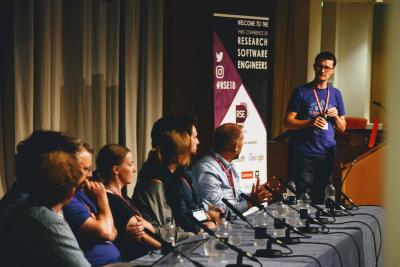Life as an RSE: a terrible career choice?
Posted on 9 August 2019
Life as an RSE: a terrible career choice?
 Photo courtesy of the Society of Research
Photo courtesy of the Society of ResearchSoftware Engineers
By Simon Hettrick, Deputy Director of the Software Sustainability Institute.
In the weeks running up to the RSE Conference, myself and some colleagues will be providing our thoughts on the questions people have submitted for our panel discussion with senior university management about how RSEs are being supported within academia. (You can submit more questions and vote on the current questions on Sli.do.)
The first question to get this treatment is “Starting as [an] RSE often means stopping the usual postdoc to professor career. RSEs on short fixed-term appoints seem a terrible career choice, what do you offer?”
I challenge anyone to find anything at all that can be described as “usual” about the “postdoc to professor career”! It’s a difficult slog through a highly politicised minefield that changes randomly with every step. It’s certainly an interesting cultural phenomenon, but only in the sense that something like the flat Earth theory is an interesting cultural phenomenon. I’d argue that we can find a better model against which to build a career for RSEs.
When we use a term like “postdoc to professor”, we’re just saying that we want RSEs to be able to progress to the highest levels of recognition and reward in academia. It’s worth saying that many university systems will already allow this to happen in theory, but only at a level of probability that would make quantum physicists feel at home. The issue around reward (i.e. pay) is probably the easier one to resolve, because it’s just a practical consideration based on the availability of funding and the right HR and finance policies being in place. Creating an environment in which the most senior RSEs are viewed in the same light as Professors across all universities is a considerably more difficult task. Universities are nebulous organisations and each one seems to have its own unique organisational and decision-making processes. Maybe the question is who do we need to convince at each university to start the culture change we are looking for?
I can’t see how we will change academic culture until the metrics by which we measure success also change. New metrics that reflect modern practices are long overdue, but no one has yet suggested an alternative that is as easy to apply as the number of papers someone writes and the amount of funding they are awarded. I’m unsure that we should be trying to suggest new metrics that can be used to measure the performance of RSEs – maybe for the short term. Maybe we should be looking to change the simple metric culture present in academic appraisals, because it’s not just RSEs that come off badly by a culture obsessed with publications and funding.
Around 37% of the UK RSE community is employed on a fixed-term contract. I’ve had people try to persuade me otherwise, but I still describe fixed-term contracts as good for employers and bad for employees. Here at least we find some solidarity with the academics, 33% of whom have a fixed-term contract. We should be fighting for more permanent contracts, but maybe this is something that should be conducted by everyone in academia and not just the people who are responsible for creating the software we all rely on?
What would you like to ask senior managers and policymakers in academia about RSEs? Let us know on Sli.do.

